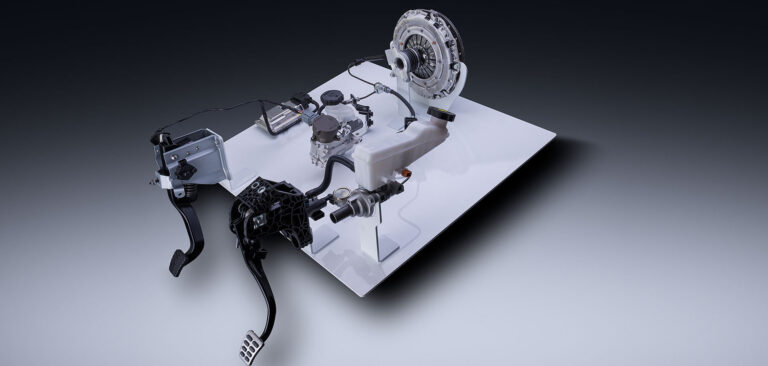With the current technology drive in passenger cars tending to cast the limelight on EVs and high-performance hybrids, mild-hybrid systems are somewhat left in the shade. However, they are quickly becoming a core part of many manufacturers’ ranges and will be vital to said car makers meeting evermore stringent fleet emissions targets.
The benefits of a mild hybrid, once weight increase is offset against engine efficiency gains, will always be marginal compared with high-power, more costly systems. Thus, the development of technologies such as Kia’s recently announced intelligent manual transmission (iMT), which provide incremental efficiency improvements at a low cost, are inevitable.
The iMT is in effect an electronic clutch, which replaces the direct acting hydraulic system traditionally used in manual transmissions with an electrohydraulic setup. Rather than being connected to a master cylinder, the clutch pedal has a position sensor, which feeds position information to a clutch control unit, which in turn directs the electrohydraulic system to operate the clutch.
The benefit of this system from an efficiency perspective, says Hyundai, is that it enables the clutch to be automatically disengaged, and the engine shut down, when a driver is coasting to a stop. As soon as the accelerator is pressed, the engine restarts, with the same thing happening if the brake is touched, to provide engine braking. Kia claims that the system contributes to an overall efficiency gain of around 3%, stressing that this was when subject to real-world driving conditions, rather than WLTP or other test cycles. The company’s existing line of gearboxes can be equipped with the technology without requiring significant redesign work.
Speaking to Engine + Powertrain Technology International, Dr Michael Winkler, head of powertrain at Hyundai Motor Europe, which was responsible for the system’s development, explained the philosophy behind the development of the iMT as such. “The system keeps as much the same as possible (compared with a traditional manual), while realizing the additional features of reduced fuel consumption and comfort.”
However, as David Labrosse, head of product planning, pointed out, developments such as this are as driven by the need to avoid harsh penalties for missing fleet emissions targets as they are by customer demand. “From 2021, one gram of CO2 per car will cost us €95 [US$107], so every gram we can save is very important. For sure, the cost of this technology is way beyond that, but we can facilitate the achievement of the CO2 targets at a reasonable cost.”
The iMT will be fitted to the recently upgraded Kia Rio EcoDynamics+, due on sale in Europe during the third quarter of 2020 with a new 1.0-liter T-GDi petrol mild-hybrid powertrain. The transmission is also due to be adopted across a number of future Kia models, with the brand set to introduce a range of new engines and MHEV powertrains later in 2020.


